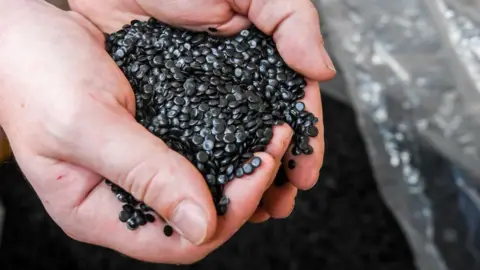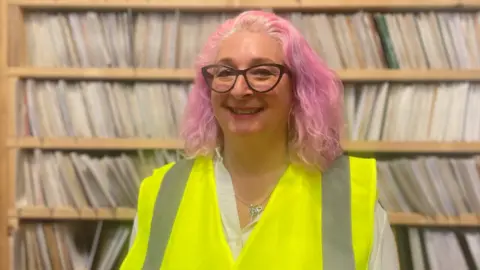Hit Me Hard And Soft: What makes Billie Eilish's records 'eco-friendly'?
 Getty Images
Getty ImagesEach year, the UK's vinyl habit is estimated to produce the same amount of emissions as 400 people.
But Billie Eilish is hoping to change the record with her new album Hit Me Hard and Soft, which came out on Friday.
Albums will be pressed on to recycled or eco-vinyl and the packaging will also be made from recycled materials.
There's scepticism about how much difference that can really make when it's linked to a huge world tour.
But Billie is keen not to be the Bad Guy, and has also been praised for drawing attention to sustainability in the music industry.
In an interview last month, the singer told Billboard she and her team were doing everything they could to minimise waste "in every aspect" of her music.
"My parents have always kept me well informed and hyper-aware that every choice we make and every action we take has an impact somewhere or on someone, good or bad, and that has always stuck with me," she said.
At a record press in South Wigston, Leicestershire, BBC Newsbeat was offered a behind-the-scenes glimpse of the process of making records more sustainable.
"Factories are so different to when I first started," says Karen Emanuel, CEO of vinyl manufacturers Key Production.
Most important are the ingredients. Records are made from PVC, a type of plastic which takes centuries to decompose.
And a key ingredient is oil - a fossil fuel.
 Getty Images
Getty ImagesAt factories like Sonic Wax, which supplies Key Production, Karen says they're replacing fossil fuels with biofuels when making the plastic granules that are the building blocks of records.
Biofuels are renewable, often made from vegetable oils, and Karen says it can cut emissions from this stage of the process by up to 90%.
Once you have the plastic granules, these are melted together to become pucks which are then stamped into records at high temperatures.
Offcuts from this process, as well as any records that don't come out up to scratch, can be melted down and re-used in the process too.
"Those trimmings can be reground into vinyl again," says Karen.
"So when people talk about using recycled vinyl, what they really mean is they're using the reground that's coming off the machine."
Vinyl that's already been pressed into records and used can't currently be recycled in this process because they'd need to be specially cleaned with chemicals, Karen says.
However, that is something the company is looking at for the future.

Aside from what goes into making the physical record, there's still the environmental impact of transporting the final product and what happens when they're eventually thrown away.
Compared to say CDs, Karen says the transport emissions from vinyl are "hugely different".
"There's a lot less material in a CD for example," she says. "With vinyl, it's a large, quite heavy thing."
One way manufacturers like Key Production aim to mitigate that is to urge their clients to opt for lighter records.
"We advise people to stick to 140g," Karen says.
Some special editions are available at 180g, but unless you've got high quality sound equipment that costs thousands and thousands of pounds, Karen says "you're not going to be able to tell the difference".
Taking 40g off an individual record can add up across a whole shipment, she says, meaning lighter batches to transport and therefore fewer emissions.
 Getty Images
Getty ImagesWould it be better to just not buy the product at all though?
It might not be that simple.
Research from Keele University in Staffordshire suggests the most sustainable way to listen to music depends on your habits.
Streaming can often seem like a low-impact option but Spotify's most recent impact report reveals its total emissions in 2023 added up to 280,355 metric tons of greenhouse gases.
The energy we use to charge and power our devices as well as the energy needed to transmit tracks across a network and store data on servers all adds up.
Streaming is still thought to be the best option if you only listen to a track a few times. For repeat listeners though, physical copies of albums are likely to be a more sustainable alternative.
And to cut down on overconsumption, Billie's also limiting her vinyl release to eight variants to limit the market for collectables.
"Vinyl is made to keep," says Karen.
"Yes, it is a plastic based product. But that product is being made more sustainably now and it's there to keep forever.
"It's not like it's being wasted. It's being bought and enjoyed."
And while old records can't yet be recycled into new ones, that doesn't mean they can't serve a purpose once we're done with them.
Karen says old records can be turned into - admittedly less glamourous - everyday items, such as household pipes.
Although she says the industry has started to wake up to the need to change thanks to big names like Billie, Karen acknowledges there's still a way to go.
Not least with other areas of the music industry - particularly touring.
Billie's tour for Hit Me Hard and Soft will see her do more than 80 shows in North America, Australia and Europe later this year.
With all the travel and intensive energy needs, that creates a significant carbon footprint.
To try to mitigate that, the Oscar-winning singer's partnering with Reverb, a non-profit organisation that works to promote sustainability in the music industry.
She worked with them on a previous tour to provide initiatives like reducing single-use plastics, offering plant-based food options and donating a portion of profits to funding climate projects.
"I've seen an incredible change, just in the past few years," Karen says.
"Bringing more awareness to people is the most important thing.
"Some of the bigger artists are taking that responsibility, which is fantastic. We need the major record labels to do it as well."


